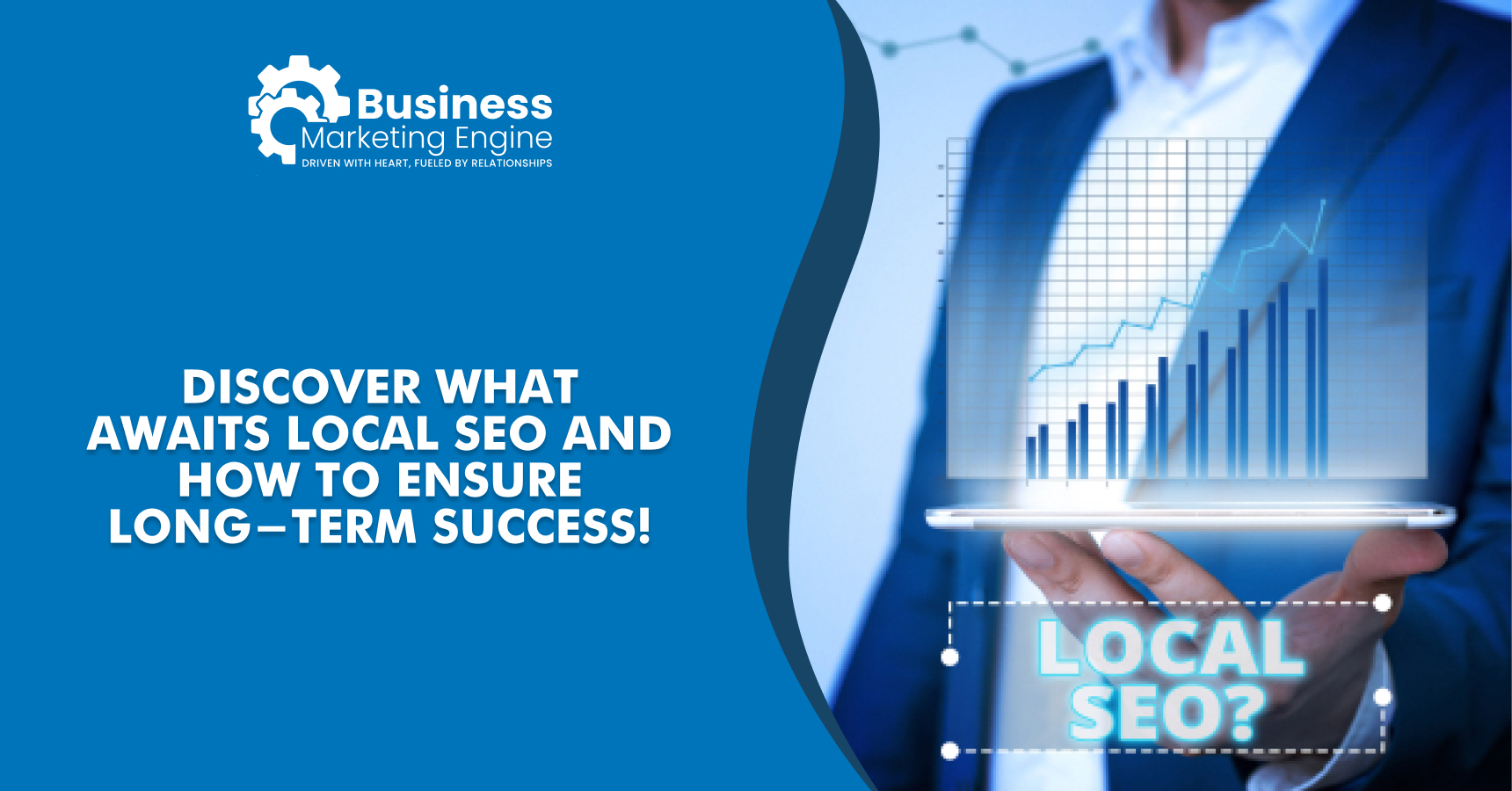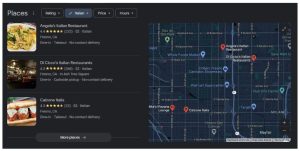Google has cemented itself as one of the local businesses most critical marketing partners worldwide.
Think about it.
Statistically, 46 percent of all Google searches are local. That means nearly half of all searches are intended to find businesses and establishments within a locality. If you do not have your local SEO in order, expect to enjoy none of the local search traffic.
In today’s business landscape, online presence and search visibility are equivalent to a company’s survival. With local SEO strategies in place, you increase the chances of local customers finding your business and expanding your reach.
If you are implementing local SEO for your company— well and good— that is not a cause yet for celebration. As Google evolves and updates, so do local SEO. Business owners like you must stay one step ahead and develop new strategies to remain relevant.
This article explores the future of local SEO. We will uncover what awaits local businesses and provide best practices for local search optimization.
What Is Local SEO and How Does It Work?
Understanding local SEO requires fundamental SEO or search engine optimization knowledge first.
SEO is a process of optimizing your webpage to appear on a search query. Google displays the most relevant results to a query. For instance, searching “basketball shoes” reveals links to various brands or outlets. Conversely, searching “best basketball shoes 2023” shows a list of roundup articles.
It’s all about intent. In the case of local SEO, it activates when the intent behind a search query contains a local context.
Local SEO appropriates the principles of search engine optimization into local searches. Instead of ranking organic search results, you rank businesses on the local or map pack.
The algorithm at work behind regular search results and local search are different. Local SEO integrates a proximity sensor, which uses GPS to deliver results relevant to a searcher’s current location. If you live in Hoboken, NJ, Google will only display businesses in or near the area. For instance, the screenshot below shows my location while searching “hardware store near me.”
The principle behind local SEO is simple: optimized businesses have higher chances of landing in the three-pack. The top three establishments in a local SEO search are beside the map pack.
Naturally, as a searcher, my prime considerations for a local service would be those that Google recommends first. That is why implementing local SEO strategies matters.
If you want to dominate local search rankings, Business Marketing Engine can help. Our SEO experts have you covered from optimizing your website content to setting up your Google My Business listing. Book a call.
 The Future of Local SEO
The Future of Local SEO
With the convenience of local SEO, we expect it to stay for a long time. People dread long searches, and local SEO saves time and effort in finding location-specific establishments.
In previous years, Google has doubled down in optimizing its search algorithms further. This resulted in various core updates that sought to improve results and make them more personalized. Aside from organic and paid search, local search was no exception to these changes.
With the direction Google is currently taking, we breakdown the future that we predict for local SEO:
AI algorithms will continue changing the landscape of local search results.
Artificial Intelligence is taking the world by storm in 2023 with the rise of ChatGPT and natural language processing (NLP). NLP is a branch of AI concerned with the computer’s ability to understand texts like humans can.
However, Google called dibs first on using NLP through their past core updates, specifically the Hummingbird and RankBrain.
Hummingbird reinforced Google’s NLP algorithm to understand the context and semantics behind search queries. Through this update, Google understood whether the goal of a search is informational, navigational, transactional or commercial.
This was the time search intent became increasingly relevant as a ranking factor. On the other hand, RankBrain became Hummingbird’s search-ranking algorithm based on the search intent.
Together, they make up Google’s AI algorithm that controls paid, organic and local searches. We predict that Google will continuously strengthen its AI algorithm to understand the human language’s semantics further.
More competition within the local searches
Today, businesses implementing local SEO strategies have a temporal advantage over non-updated competitors. But with the increased attention towards digital marketing, even among small businesses, establishments will catch on quickly. More companies will strengthen their local SEO efforts, improving their organic ranking and Google My Business presentation.
Location-based SEO (Geolocation) Is becoming increasingly important
The strength of local SEO relies heavily on the preciseness of Google’s proximity sensors. A user’s local search would be pointless if Google tags a different location.
Google’s geolocation efforts are far from perfect today, sometimes hitting off the mark. But it is only a matter of time before future updates deliver stellar and accurate results.
Voice search is becoming more accurate for local searches.
From computers to smartphones, we have seen the world evolve toward an emphasis on convenience. Now, smartwatches are becoming more and more ubiquitous. Since typing is impossible in smartwatches, companies focus on strengthening voice recognition algorithms. Google is another participant in this race.
Unlike typing, speech patterns use different semantic rules. Google must recognize this difference and adjust its strategy for ranking search queries. That means results vary depending on a user’s chosen medium, whether type or voice search.
Implementing these updates will change the landscape of search results, including local SEO.
Images will become ranking factors for local SEO
Images are not new concepts in the search engine optimization scene. For many years, Google has rewarded content that features relevant images with related alt texts. But with increased attention to Geolocation and Google Map’s relevance in local searches, images will define local SEO.
We predict that Google will integrate image-detecting algorithms to strengthen its geotagging efforts. For instance, you can find the precise location of an establishment through an image. Determining the exact location is possible by analyzing the details of the surroundings, like the buildings and structures.
Online reviews and GBP ratings will play a massive part in local SEO strategy.
Reviews and ratings are helpful metrics to increase a business’s trustworthiness for a user. However, they still need to be bona fide ranking factors in today’s local SEO landscape.
To favor more established entities, Google might reward businesses with reviews over those that lack them. While not new in SEO ranking, some unreviewed and unverified companies still slip through the cracks.
Mobile-first indexing will be more powerful
Google has finally made mobile optimization one of its ranking factors for organic searches. However, the link between mobile optimization and local SEO ranking remains to be seen today.
We expect Google to clarify this over the following updates. Will they grant higher rank to local establishments with mobile-optimized websites than businesses with non-mobile-friendly sites? How will local small companies fare in the local SEO game if they do not have their own website? These are some of the questions that only Google’s algorithm can answer.
Only time will tell the future and features that await Google’s local search. But one thing is sure; local SEO will remain relevant for decades. As such, employing best practices on local SEO can help secure your success in the long term. Keep reading to discover how you can make your local SEO stand out above the rest.
Local SEO Best Practices for a Long-term Success
Etching your brand among the local SEO greats is a long and steady process.
Like regular SEO content, you must wait until Google’s crawlers index and rank your website. Once you receive a rank, constant optimization is required to improve your local SEO standing.
Doing just that sets your business up for long-term success. Here are some best practices to walk you through the entire process.
 Create a contact page for your website.
Create a contact page for your website.
This is a given. By now, every business owner with a website must have a dedicated contact page across their site.
Your contact page must contain an opt-in or contact form for customers who wish to communicate with your business. Aside from that, it is essential to show your NAP, which stands for:
- Name
- Address
- Phone number
Indicating your address is not really for your customers’ benefit. One Google search is all a customer needs to know where you are located. Indicating your address is more intended for Google’s crawlers. A clear and specific address tells Google your business is situated in the location, helping your local SEO efforts.
On the other hand, the phone number is dedicated to customers more inclined to call than email. It never hurts to give them another option to reach out.
Create Google Business Profile
The next step in your local SEO strategy is establishing a Google Business Profile, formerly Google My Business. Think of it as a Facebook account for your business and on Google.
Having a Google Business Profile allows for easier discovery where customers can learn about your business and contact information. Plus, an account lets you respond to reviews and manage the news on your Google Maps listing. Finally, almost all companies that want to dominate local search have one; about time you make yours too!
Here is some information you want to be reflected on your business profile:
- Exact address
- Open and close times
- Health and safety protocol
- Website
- Possibly product listing or menu for restaurants
- Images
- Answers to questions (if any)
- Responses to reviews (if any)
Having these things at your disposal builds your credibility among customers. Of course, it adds a dash of professionalism on your behalf, which is always desirable!
Create citations in local directories and listings.
Local SEO is not a battle of “who’s the better business?.” It is more, “which business does Google trust and recognize more?.”
That said, the more web pages on the internet pointing to you, the more recognizable you become. Creating citations in local directories helps with this greatly!
Business review websites are some examples of directories you can sign up for. Your listing and contact information on the website will point Google’s crawlers back to you. Some examples of these websites are:
- Yelp
- Angi
- Consumer Affairs
- Foursquare
- Glassdoor
- HomeAdvisor
- Judy’s Book
- Hotfrog
Perform local SEO audits.
SEO auditing is the process of evaluating your company’s local SEO performance. As mentioned above, frequent revisitation and optimization are important for local SEO success. Audits help in this regard.
While there are tools you can buy to audit your business for you, you can also do it manually. Here are things to look for during a local SEO audit:
- Use of keywords throughout your website
- Revisiting citations and directories
- Fixing incorrect or inconsistent information like location, email or number
- Inspecting backlinks
- Purging duplicate contents
- Managing Google Business Profile information
Boost the internal linking on your website.
Internal linking is a portal for web crawlers to access the hyperlink on a website’s content. Internal links on your content that lead to your contact page better acquaint Google with your localization. This boosts your local search performance.
Moreover, internal linking also helps in reinforces your customers’ desire to contact you, especially with blog posts. Customers feel more motivated to contact you when your content is high-quality and authoritative.
Optimize the content, titles, headers, and meta descriptions.
You can optimize blog posts and other web content to serve your local SEO efforts. Inserting as many localized keywords as possible helps web crawlers understand where your business truly resides.
One way to do this is to produce blog articles mentioning your location. For instance, it could be as simple as, “Company XYZ is the go-to plumber for all homeowners across location ABC.”
As much as possible, the content title, headers and meta descriptions must all reflect your company’s location. This will help your business appear in local searches and boost your map pack ranking.
Adapt mobile compatibility of websites.
Mobile optimization recently became one of Google’s ranking factors in light of mobile devices’ prominence. But aside from serving organic SEO, mobile friendliness also helps with local SEO for small businesses.
Since 60 percent of all global traffic comes from mobile devices, people likely find your business on their phones. Just make sure to make your phone number on the contact page clickable.
People searching for your business through mobile can contact you with one finger tap. This significantly reduces the inconvenience of having to type your number manually.
Participate in local community events.
Community events are an opportunity to give back to the community and pay it forward. But aside from serving your locality, community events are also opportune moments to boost your local SEO.
For one, community events come with documentation, typically from the activity’s proponent. You will benefit when they publish local content about the event and recognize each participant. Even uploading images on social media pages and tagging your business can impact your local SEO.
Every mention of your business reflects your local SEO efforts.
Obtain authoritative and relevant local backlinks.
As mentioned above, hyperlinks are potent tools to help crawlers scour the web. When businesses link to your website, you increase your visibility. In this context, having local blogs talk about your business will help your local SEO ranking.
One way to obtain authoritative and relevant backlinks is through guest posting. Reach out to the local blog if you could write for them. Sometimes they will charge a fee for the exposure, which is okay considering what you are getting in return.
Add Google Maps to your website.
While not necessary, adding Google Maps to your website helps with customer success. Instead of searching where your exact map location, you make it more convenient for people to find you. Plus, Google Maps adds an eye-catching flair to an otherwise bland contact page.
Insert customer testimonials and reviews on your website.
Customer reviews to build your credibility as a business. While they can be seen from your Google Business Profile, you can insert them into your website. This way, people will not have to leave your domain to see what people say.
Pro tip: add reviews that mention your service area to help local SEO efforts/`.
Use schema on your website.
Schema markup is a structured code you can add to your HTML, which helps the search engine comprehend your content better. By structuring your data better, search engines can differentiate various contents and business websites.
One way to take advantage of this is by using LocalBusiness schema markup. This takes your meta description to the next level by adding rich snippets. For instance, schema markups let you insert your ratings, prices, NAP or geolocation information.
It improves local SEO by providing more accurate and relevant search results. Ultimately, it helps users find what they’re looking for faster.
Encourage more client testimonials and reviews.
Encourage your customers to write reviews or testimonials about your product or service. As mentioned, testimonials and reviews are credibility metrics but are also word-of-mouth marketing. Customers will choose the verified one between two businesses, one with a check and the other without any.
Whether favorable or not, watch your local SEO fly high with updated and accurate ratings.
Local SEO is more complicated than it seems. However, with enough effort to study the ins and outs of local SEO, you can dominate local search.
Alternatively, full-service marketing agencies can save you from the headache of dealing with local SEO. At Business Marketing Engine, we can help you dominate local search minus all the hassle associated.
If you are interested, book a call.



 The Future of Local SEO
The Future of Local SEO Create a contact page for your website.
Create a contact page for your website.


